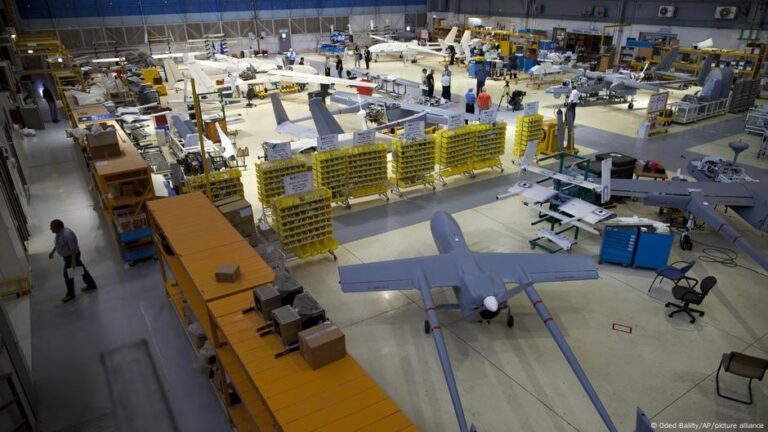War is expensive. Besides causing destruction, personal tragedies and deaths, it costs a lot of money to buy and mobilize equipment. It also costs manpower as Isreal — and its economy — is finding out on multiple fronts.
Since the militant islamist group Hamas attacked the Jewish state on October 7, 2023, Israel has been engaged in intense fighting in Gaza. After that, Israel launched airstrikes into Lebanon as retaliation for cross-border Hezbollah missile and drone attacks. Last week, Israel struck deep within Iran with the aim of disabling its nuclear capabilities.
Israel has big problems and big budgets
With all this going on, Israel’s economy is under significant strain. Many reservists have been called up to fight forcing them to temporarily leave their jobs. Adding to this labor shortage, work permits for many Palestinians have been cancelled and crossing borders has become increasingly difficult for them.
All this makes filling job vacancies difficult. In April, the country reported a 3% unemployment rate, down from 4.8% in 2021.
At the same time, military spending in Israel has surged. In 2024, it grew by 65% to reach $46.5 billion (€40.4 billion), according to a report by the Stockholm International Peace Research Institute published in April. That brings its military spending to 8.8% of GDP — the second highest in the world after Ukraine.
The country’s 2025 budget includes spending of 756 billion Israeli shekels ($215 billion; €187 billion) — a 21% rise over the previous year. It is set to be the largest budget in Israeli history and includes $38.6 billion for defense, according to reporting in The Times of Israel.
Israel’s economy faces uncertain future
Itai Ater, an economics professor at the Coller School of Management, Tel Aviv University, says the war is “very expensive” at the moment, and there is “huge uncertainty about the near and long-term future.”
“The military costs on both the offensive and defensive fronts are very high. This will surely impact the budget, the deficit, the GDP and the Israeli debt,” Ater told DW.
The costs are indeed high. In the past 20 months, many Israelis have spent hundreds of days in reserve duty. Others have been evacuated from their homes near border regions leading to big disruptions in their lives. Social services are under strain.
Since last Friday’s attacks, many people have not worked, including in manufacturing, trade, tech and the education system, says Ater.
Commercial flights in and out of the country are also currently suspended. Airlines have evacuated their jets and airspace over much of the Middle East is closed.
Israeli government increasing taxes to pay for it all
To compensate for some of this financial strain, the government has increased taxes. The country’s value added tax (VAT) for most goods and services went from 17% to 18% at the beginning of this year. The health tax deducted from employee salaries and national insurance contributions went up, too.
The Israeli economy has suffered over the past year and a half but has been “surprisingly resilient,” says Benjamin Bental, a professor emeritus of economics at the University of Haifa.
While tourism, manufacturing, construction and farming have suffered, other industries like high-tech, defense and retail food remain resilient. In 2024, the economy brought in over $540 billion, topping both previous years.
Bental points to the continued success of the high-tech sector and the overall labor market that is “as tight as it has ever been.” Warnings that critical energy and internet infrastructure would be targeted by Hezbollah or Iran have, so far, proven unfounded leaving businesses on track.
Israel’s high dependence on high-tech
It is no coincidence that Israel is known for its advanced high-tech industry.
The sector employs 12% of the country’s workforce and pay around 25% of all income taxes because of their high salaries, according to US investment bank Jefferies. High-tech services and products make up 64% of the country’s exports and around 20% of total GDP.
But the number of high-tech employees in Israel has stagnated since 2022, according to a report released in April by the Israel Innovation Authority.
In 2024, the number of local high-tech employees decreased for the first time in a decade. At the same time the number of employees leaving the country for long-term relocation increased, the report found.
Today, these companies still have around 390,000 employees in Israel and a further 440,000 outside the country. Some fear higher taxes could push more mobile companies or workers to leave.
Investors and long-term risks
The biggest unknown now is the general uncertainty of the situation in and around Israel. This impacts workers, employers and investors.
“Nevertheless, if you look at the stock market and the foreign exchange rate, it seems that investors are optimistic, likely anticipating that the war would end soon, that Iran’s nuclear threat would be eliminated and that the economy would recover and get better,” said Ater.
For investors, the short-term risks have increased, but the real impact depends on how long the military conflicts last and how they end.
“An alternative scenario, in which we enter a long attrition war with Iran, is also likely,” said Ater. “In that case, the economy is unlikely to flourish.”
Looking ahead, Ater sees the security situation in general, and the Israeli-Palestinian conflict in particular, as one of the country’s long-term economic challenges. Besides these tensions he says it will be important to also keep an eye on the country’s internal social divide and the judicial overhaul and its implications on democratic institutions.
Edited by: Uwe Hessler


